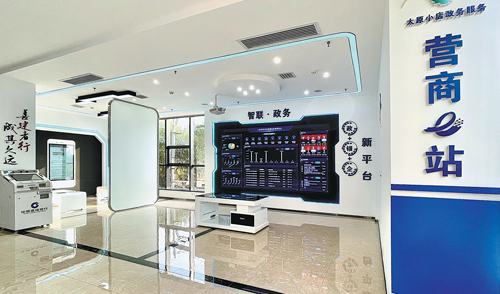Shanxi ramps up drive to build better business environment

The Xiaodian district administrative service center in Taiyuan features a section providing intelligent services. [Photo by Wang Pei for China Daily]
Raft of red-tape cutting, incentives for enterprises operating in province
The government of North China's Shanxi province is going all out to attract investors by improving its business environment.
A recent effort by the government saw the release of a five-year plan on Nov 16 for developing the business environment.
This is the first five-year plan focused on the business environment in Shanxi, according to Lian Jianlin, deputy chief of the Shanxi Bureau of Administrative Services.
Lian made the remarks at a news conference held on the same day explaining the details of the five-year plan. The conference was attended by officials from the Shanxi Department of Housing and Urban-Rural Construction, the Shanxi Market Regulation Bureau, the Shanxi branch of the State Taxation Administration and the Shanxi Administrative Services Center, who all shared their insights into the new plan.
Lian said the plan will play an important role in investment promotion by creating an efficient, inclusive and fair environment for all business activities in the province.
The official noted that the plan focuses on making it easier to start a business by promising streamlined approval procedures, reduced administrative service costs and whole-process assistance from officials.
"For investments in low-risk projects, a simplified approval procedure will be applied, which can normally be completed in 10 days and involves zero service costs," Lian said.
"With both in-person and online platforms for administrative services, applications for starting businesses can be submitted 24 hours a day, seven days a week."
Business registration used to require approvals from a number of governmental institutions that were usually scattered across a city, according to Guo Xin'an, an official at the Shanxi Market Regulation Bureau.
Market regulation bureaus are the main administrative services providers that issue business licenses to startups. However, before they obtain the licenses, business owners needed to first obtain various certificates, including those for fire safety, sanitation and admissions for sales of drugs and medical equipment before they could apply for a business license to start operating.
The old practice meant that a business would spend several months applying for certificates before they could get a business license and get their business up and running.
But the situation has changed in recent years, Guo said.
"Now, businesses can put forward their registration applications to a local administrative services center, where officials from different institutions sit under one roof to handle the applications for license and various certificates," Guo said. "They can begin their operations upon acquiring a license, while other certificates can be dealt with afterward."
The official added the number of certificates required has also been reduced as a result of "merging similar functions into one certificate".
"For instance, a drugstore needed to apply for certificates for medicine sales, medical equipment sales and health food sales in the past. Now it only needs one certificate for all of those things," the official explained.
In addition, the use of online systems has further improved the efficiency of business registration.
According to Guo, entrepreneurs in Shanxi can submit their business registration applications and materials needed through various provincial e-government platforms. "For most of the applicants, they can obtain their licenses in one day and begin their operations immediately,"Guo said.
Because of this substantial improvement in efficiency, the number of newly registered businesses has kept a fast pace of growth.
Shanxi was home to more than 3 million market entities at the end of October, and has had an average monthly increase of 24,100 in recent years, according to Guo.
During the first three quarters of this year, he said a total of 379,700 businesses were added in Shanxi, representing an average daily increase of nearly 2,000.
Guo predicted there will be a boom in entrepreneurship in the years to come as a result of the improved business environment.
"We expect there will be a total of 4.5 million market entities in Shanxi by the end of the 14th Five-Year Plan (2021-25), compared with about 3 million at present," Guo said.
The taxation institutions in Shanxi are playing their part in improving the business environment by offering greater convenience and more incentives to enterprises.
The Shanxi branch of the State Taxation Administration launched an e-taxation platform in late August. A focus of the platform is to publicize all taxation incentive policies.
"It used to be a complicated procedure to check what kind of incentives we were eligible for," said Mao Zhiming, financial chief of Shanxi Coal Mining Machinery Manufacturing. "It was even more complicated to apply for a tax reduction or rebate."
Mao said today he only needs to log onto the home page of the e-taxation platform and enter the company's name, and he can be informed of the incentives immediately. "Once I put forward our online inquiry for a tax reduction or rebate, an official at the tax bureau will contact us and offer follow-up services quickly."
Li Shu contributed to this story.



